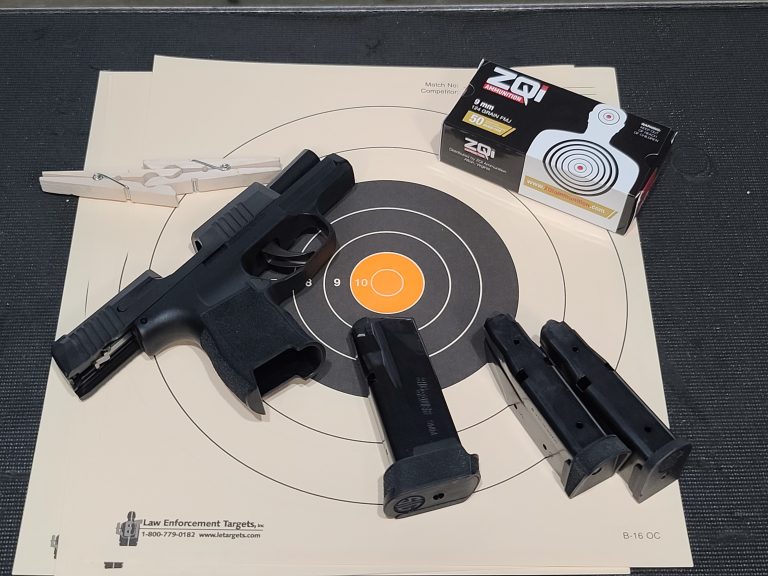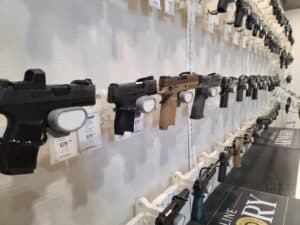Oregonians will have a chance to vote on one of the strictest gun-control laws in the nation on Tuesday. The ballot initiative faces an uphill battle, even in the deep blue state.
Measure 114 represents one of the most sweeping gun-control laws ever submitted directly to voters anywhere in the country. The measure aims to establish a new permit-to-purchase for all gun sales and ban the sale of some of the most popular ammunition magazines in the country.
The measure would require any resident who wishes to purchase a gun to first obtain a permit from their county sheriff, which they would have to renew every five years. To get the license, they would need to pay a $65 fee, complete a firearms safety course at their own expense, submit a photo ID, be fingerprinted, and pass a criminal background check. The measure would direct state law enforcement agencies to maintain a database of all permit-to-purchase applicant information, which would function as a de facto registry.
Additionally, residents would be prohibited from purchasing, using, transferring, or possessing ammunition magazines capable of holding more than ten rounds. Currently-owned magazines would be grandfathered only for use on private property and shooting ranges, making their continued use for public carry off-limits. Violations would be a class A misdemeanor offense.
Public polling on the measure has been limited, but the few that have been conducted show a divided electorate that appears to be shying away from the initiative. An Oregonian poll conducted in late September found a bare majority, 51 percent, of likely voters said they support the measure, with 39 percent opposed. Another 10 percent told the pollsters they were undecided.
A more recent poll from the Salem-based Nelson Research finds that 46.1 percent of likely voters support the measure, while 49.4 percent oppose it. Another 4.5 percent say they’re still undecided.
There are also broader structural factors that cast doubt on its prospects.
A Gallup poll released last week finds a steep decline in voters nationally who rate gun policy as an important electoral issue. Just 38 percent of registered voters now say gun policy is extremely important to their vote, down 17 points from June when the issue tied with the economy at the very top of voters’ lists. The issue now trails the economy, abortion, and crime among registered voters’ list of priorities.
Furthermore, Republicans are actually five percentage points more likely to list it as extremely important than Democrats. That, on its face, would seem to bode poorly for measure 114 in Oregon. All things being equal, Republican voters tend to favor less restrictive gun laws.
The state is also contending with a bit of a groundswell of support for right-of-center politics more generally after decades of Democratic hegemony. Even though Oregon voters have not elected a Republican Governor since 1982, Republican Christine Drazan has been consistently leading in the polls over her Democratic opponent for the last couple of months, thanks in part to a competitive independent run by a disgruntled Democrat. That could indicate that the state’s voters have soured a bit on Democratic voting priorities.
The history of ballot box gun-control measures also casts doubt on Measure 114.
In 2016, voters in Nevada voted on a universal background check initiative. While voters approved the measure, it barely survived, passing by about half a percentage point. That’s despite universal background checks routinely polling above 85 percent support in most national public opinion polls.
That same year Maine voted on the same issue. They voted to reject the measure by a four percent margin. And that was in the same election where voters broke for Hillary Clinton (D.) over Donald Trump (R.) by about three percentage points.
The narrow passage of universal background checks in Nevada, and the outright defeat in Maine, call into question the viability of a far more comprehensive and restrictive measure in Oregon.
However, Oregon is much more Democratic than Nevada or Maine. Its deep blue politics could be a force to counteract the trend of underwhelming results for other ballot initiatives.
But Democrats aren’t wholly united in support of the policy either. Some progressive criminal justice reform advocates have voiced concern that Measure 114 would give law enforcement over who can buy a gun.
“The best world is the world in which almost no one has a gun,” Athul Acharya, executive director of the civil rights organization Public Accountability, told Portland Mercury. “The worst world is one in which the Proud Boys and Patriot Prayer have guns, and no one else has a gun. This measure, I think, gets us closer to that world.”
“Given the undisputed bias of police against folks who are BIPOC, poor, part of the LGBTQ2SIA+ community, and/or have leftist politics, Measure 114 would be a nightmare for all of these groups,” another resident told the outlet.
Other progressive activists have contended that the measure’s ban on ammunition magazines would be enforced disproportionately against minorities.
“That (Measure 114) is in effect a hunting license for police to search for things, to arrest people who have them, to put them through the court system,” Graham Parks, a Portland resident and Oregon State Democratic Party Central Committee member, told a local Fox affiliate.
Of course, there’s still a distinct possibility that the measure will pass on Tuesday. The state’s default political landscape would seem to lend itself to the measure passing, and spending has trended significantly in its favor. Supporters of 114 have outspent opponents $2.3 million to $131,000 as of November 4th.
But to pass, it will have to overcome a coalition of opposition consisting of progressive criminal justice advocates, gun-rights proponents, and voters swayed by a good year for conservative politics more broadly. It will also have to depart from a recent trend of gun-control ballot measures underperforming polling.







Only Members can view comments. Become a member today to join the conversation.